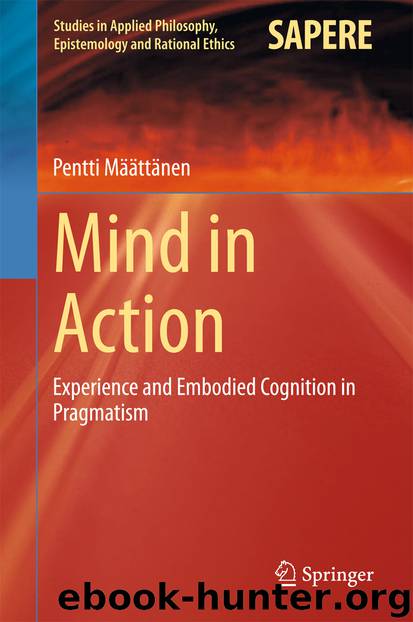Mind in Action by Pentti Määttänen

Author:Pentti Määttänen
Language: eng
Format: epub
Publisher: Springer International Publishing, Cham
4.3 Linguistic Meaning
In Ludwig Wittgenstein ’s language games linguistic meaning is defined by the principle that meaning is use. The meaning of a word is the way it is used in a linguistic community. It is easy to see that Wittgenstein’s definition is an instance of Charles Peirce ’s definition (Määttänen 2005). Surely the habits of using a word belongs to the habits the word involves. According to John Dewey the word “hat” gains meaning in the same way as hat, by being used in a given way (Dewey MW 9 1980, p. 19). Dewey’s definition makes explicit the parallel between words and other things that can be used, which is implied by Peirce ’s definition. It does not restrict the things (involving habits) in any way. Also Wittgenstein refers to the analogy between words and tools. Is this parallel between words and tools mere analogy?
If it is a mere analogy, then tools and other things involving habit are not carriers of meaning of their own right. Language games would contain only linguistic moves. This raises the problem of the origin of linguistic meanings. Rows of letters have no meanings just by virtue of their physical properties. This is a kind of semiotic circle: words of a language are defined by other words of the same language. How to get from the language to the world?
As pointed out, it is problematic to explain the ability to understand language by appealing to mental content s. Mere postulation of mental entities remains circular without further explications. The problem of how we understand language is solved by appealing to entities that are simply thought into real being, and the only thing we get to know about these entities is that they solve the problem that we had in the first place. Postulation of objective immaterial meanings is not consistent with naturalism and anyway circular in the same way. On the other hand, ostensive definition of words by pointing to something and giving it a label has its difficulties also. For example, if we try to teach somebody a completely new language by pointing to something and uttering “gavagai” (Quine 1960), there is no way of avoiding the problem of aspect. What aspect of the observed thing or situation are we pointing to? Further explanation with the same language will not help. This kind of problems led Wittgenstein to develop his notion of language game with its pragmatist notion of meaning .
The basic error in getting stuck with the problem of aspect concerns the notion of experience . Ostension and sense perception do not give solution. The pragmatist notion of experience, where action is included, and the wide notion of meaning , where also tacit (non-linguistic) meanings are included, give the way out. The parallel between words and tools is not a mere analogy. Tools and instruments, doors and windows and indeed anything that may involve habits are possible carriers of meaning. Meaning is defined in the same way at both levels of meaning (tacit and linguistic), namely by saying that meaning s are habit s of action.
Download
This site does not store any files on its server. We only index and link to content provided by other sites. Please contact the content providers to delete copyright contents if any and email us, we'll remove relevant links or contents immediately.
Algorithms of the Intelligent Web by Haralambos Marmanis;Dmitry Babenko(17576)
Jquery UI in Action : Master the concepts Of Jquery UI: A Step By Step Approach by ANMOL GOYAL(10029)
Test-Driven Development with Java by Alan Mellor(7751)
Data Augmentation with Python by Duc Haba(7625)
Principles of Data Fabric by Sonia Mezzetta(7398)
Learn Blender Simulations the Right Way by Stephen Pearson(7307)
Microservices with Spring Boot 3 and Spring Cloud by Magnus Larsson(7156)
Hadoop in Practice by Alex Holmes(6693)
RPA Solution Architect's Handbook by Sachin Sahgal(6532)
The Infinite Retina by Robert Scoble Irena Cronin(6235)
Big Data Analysis with Python by Ivan Marin(5956)
Life 3.0: Being Human in the Age of Artificial Intelligence by Tegmark Max(5539)
Pretrain Vision and Large Language Models in Python by Emily Webber(4915)
Infrastructure as Code for Beginners by Russ McKendrick(4670)
Functional Programming in JavaScript by Mantyla Dan(4508)
WordPress Plugin Development Cookbook by Yannick Lefebvre(4406)
The Age of Surveillance Capitalism by Shoshana Zuboff(4272)
Embracing Microservices Design by Ovais Mehboob Ahmed Khan Nabil Siddiqui and Timothy Oleson(4160)
Applied Machine Learning for Healthcare and Life Sciences Using AWS by Ujjwal Ratan(4151)
